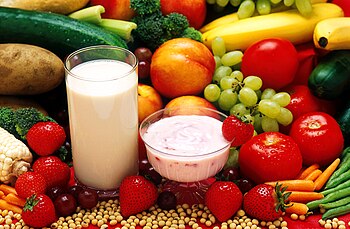736
 |
| Formula for food Image : TheNextWeb |
We have long known that food and nutrition is a science in itself, and like every science, eating food and the assimilation of nutrients also has a formula to it, if not done right and with the right coupling agent, can be useless, and render absolutely nothing.
This may come as a revelation for you, but scientists have been working on right combos, for a while now. There have been a number of studies done and experiments carried out on both mice and human, that have led to various discoveries about nutrition and food about the importance of eating not only the right food, but eating it the right way.
Here are some fun facts that’ll get you thinking
- The consumption of coffee or tea during a meal reduces the body’s uptake of iron from food in comparison to a glass of orange juice that actually doubles the uptake. (J.M. Bourre, Vol 10. Number 5 Journal of Nutrition Health and Aging, 2006)
- Animal protein (milk, cheese, curd, meat etc.) increases the uptake of iron from food, than protein from soya bean that actually decreases the uptake slightly. (J.M. Bourre, Vol 10. Number 5 Journal of Nutrition Health and Aging, 2006)
- Plant sources of iron eg. Spinach, are far more difficult to assimilate than in animal products. So if you are in an urgent need of an iron boost, then Popeye’s way is probably not the best. You are better off eating clams! But all is not lost with spinach; studies say that the compound (oxalic acid) that obstructs assimilation of iron from spinach can be reduced by boiling or blanching spinach. So remember that little trick, the next time you feel anaemic and have a hankering for iron.
- Vitamin A is present in both, foods from vegetarian origin as well as animal origin. Studies have shown animal origin Vitamin A is ready to use by the body in comparison to that found in plants.
-

Iodine (Photo: Wikipedia) Iodine deficiency is prevalent all over the globe. Even though there have been efforts made to introduce iodized salt into populations, people still seem to be suffering of iodine deficiency. One problem may be due to goitrogenic food. Iodine may not be assimilated into the body when combined with a goitrogenic food. These are plants that come into the genus Brassica (cabbage, brussel sprouts, cauliflower, broccoli, mustard etc.) or even food like spinach, pears, strawberry among others. The good news is, that the goitrogens are inactivated by heat in most veggies, except in soy and millet, where trace amount still remain.
- The presence of phytic acid can also obstruct the assimilation of vital minerals such as zinc, calcium, magnesium and iron. Phytic acid is present in legumes, seeds, nuts grains and a few vegetables. The compound has a higher affinity to minerals and binds to them making it impossible for the intestine to digest, which is why many people suffer of nutrient deficiency despite having a wholesome meal. The effect of Phytic acid can be reduced by sprouting the seeds or legumes, fermentation or even leavening before consumption (so in a way bread is good).
 |
| A diet rich in soy and whey protein (Photo: Wikipedia) |


1 comment
[…] per year for making animal feed and food. Half a million tonnes of which gets utilized in creating vegetarian and vegan foods. Soybean production is linked to the destruction of Amazon rainforests. Its environmental impacts […]